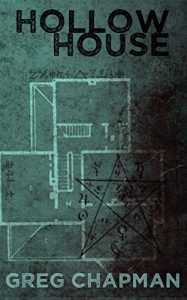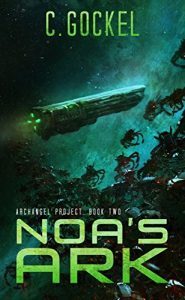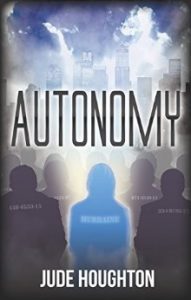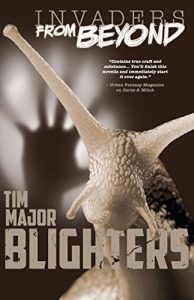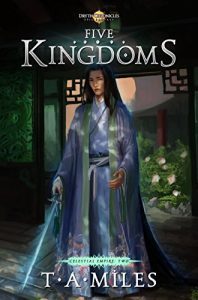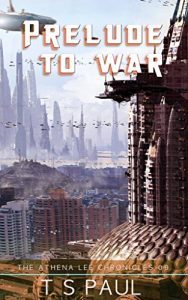Cora Buhlert's Blog, page 96
August 25, 2016
Of Hugos, Puppies and WorldCon 2016 – and a bit about the Clarke Award
Yeah, we’re still talking about the 2016 Hugos and MidAmeriCon II, the 2016 Kansas City WorldCon. Hell, I even had an (alcohol-free) Hugo cocktail (no relation to the award) today. Previous posts on the 2016 Hugos are here, here and here, for those following along.
First of all, let’s start of with the third major science fiction award (after the Nebula and the Hugo), Britain’s Arthur C. Clarke Award, which in 2016 was awarded to Children of Time by Adrian Tchaikovsky. This wasn’t my personal favourite, but nonetheless a very good choice.
At Strange Horizons, Abigail Nussbaum reviews all the 2016 Clarke Award nominees in a two part post. I don’t necessarily agree with her verdict – but then, I rarely agree with Abigail Nussbaum’s reviews, even though I always enjoy reading them – but she makes some interesting points.
Next, let’s have some updates on the various (yes, there were several) harrassment and expulsion incidents:
I’ve already talked about the problematic short fiction panel, which was hijacked by moderator Dave Truesdale who instead of moderating read out a prepared statement about how political correctness and special snowflakes were ruining SFF, until he was shut down. Truesdale was later banned for violating the Code of Conduct.
Now it turns out that an audience member at the panel, a self-declared rabid puppy with the username Darth Troutman, was also expelled for disrupting the panel, yelling at panelist Neil Clarke and terrifying an audience member.
Greg Hullender of Rocket Stack Rank, the short fiction resource that might well have made the best fanzine ballot, if not for canine interference, was also at the panel in question and talks about it, as well as about his general experiences at MidAmeriCon II.
Mary Robinette Kowal was also suspended for violating the Code of Conduct by serving whisky at a panel. Doesn’t strike me as that much of an issue, but Americans are weird about alcohol and convention centres don’t like beverages brought in from outside. And it’s a good thing that the con is consequent about enforcing its rules, regardless who the affected party is. Mary Robinette Kowal agress BTW and generally handles the whole thing in a much more adult way than some other people one might name.
Campbell Award nominee Alyssa Wong and Hugo nominee Brooke Bolander were both the targets of a harrassment incident that was a continuation of another harrassment incident at WisCon. Alyssa Wong explained what happened on Twitter. There is no Storify, but if you click on the embedded tweet below, you should be able to follow the whole thread.
Okay, so, I'm gonna give a brief rundown of what happened to me at @MidAmeriCon2. But first: I am so impressed by the con response team.
— Alyssa Wong (?????) (@crashwong) August 22, 2016
Bull Spec has more on the issue, since it turns out the harrassers were two of their columnists/reviewers, now suspended.
Vasha offers her own version of a puppy-free Hugo ballot in response to Stephanie Zvan’s, to which I linked in the last post. She comes to the conclusion that Toni Weisskopf would have made it onto the ballot without canine help and Jerry Pournelle would have made the longlist, but that no other overt puppy candidates would have made it.
At The Digital Reader, Nate Hoffelder wonders whether one can truly speak of a puppy defeat, when several of the winners were either on the sad puppy recommendation list or the rabid puppy slate, even though all puppy list/slate winners were generally popular and not unlikely choices with the possible exception of Abigail Larson. Nate Hoffelder also wonders whether the sad puppy recommendation list might serve the function of a kingmaker going forward.
ETA: At the New York Times, Alexandra Alter interviews N.K. Jemisin about The Fifth Season, her Hugo win and the sad puppies.
Hugo winner Nnedi Okorafor was also interviewed for the Salon article to which I linked yesterday. Unfortunately, she was on the road and didn’t reply to the e-mail in time, so she posts the answers on her blog instead.
Here is a quote:
One day this group of irate individuals will realize no one is coming to erase them, and that all stories are richer and more enjoyable when there are more of them (more stories, I mean).
Alas, that day is not yet here and so the puppies are still busily having meltdowns and declaring that the Hugos are irrelevant and the Dragon Awards are the totally superior saviours of the field. They seem to believe it, too. Still, if it makes them happy and keeps them from starting any further slating campaigns…
In the last round-up, I already linked to Brad Torgersen’s epic meltdown, complete with the declaration that he never wanted a Hugo or a Nebula or a Locus Award or the Campbell Award anyway.
Now Camestros Felapton responds to Torgersen’s post and points out some of the inconsistencies in his argument.
Talking of inconsistency, a blogger calling themselves The Political Hat tackles the 2016 WorldCon and Hugo Awards from a puppy perspective and offers a rather incoherent post in which they complain once more about Moira Greyland getting no awarded and then go on to complain about the various changes to the voting system proposed at the WSFS business meeting. The Political Hat also claims they have never heard of The Fifth Season by N.K. Jemisin (Uhm, if you vote for the Hugos, you’re supposed to read the nominees, but at the very least you should look at the shortlist), complains about a panel on “Science fiction as protest literature” and how they were triggered by Donald Trump jokes.
On the other hand, a rank and file sad puppy blogging at Be Swift, Be Precise had a generally good time at MidAmeriCon (and also shares detailed panel notes in a several posts) and found that most people were friendly to him. He does seem to believe that many of what he calls Social Justice Warriors are beginning to adopt what he considers puppy positions, which he views as a win for the puppies. Personally, I suspect that the positions were never all that different in the first place – for example, I agree with several points of the Human Wave Manifesto – but that the blatant slating, the strident rhetoric and the utter inability to recognise that other people might have other tastes put a lot of people off.
ETA: Talking of the Human Wave, in his Hugo reaction post, sad puppy supporter Jeff Duntemann links to a multi-part essay on the Human Wave movement and also declares WorldCon, the Hugos and trad-published science fiction dead, whereas indie SFF writers will rescue the genre for Nutty Nuggets. Now I’d never heard of Jeff Duntemann before – I only found his blog because I did a search for the Human Wave manifesto and his multi-post series on the subject came up. However, a bit of googling revealed that Duntemann is an SF writer who was even nominated for a Hugo back in 1981.
Meanwhile, Larry Correia has finally found Damien Walter’s Guardian article savaging his writing and has the predictable meltdown. Ironically, neither Larry Correia nor Dave Freer realise that by pointing out how many books they have sold, they’re actually confirming Walter’s point that for the puppies, sales figures are the only metric that matters. Never mind that they apparently haven’t heard of the “Never respond to reviews, no matter how wrong-headed they might be” dictum either. Like his fellow puppies, Correia is also still hung up that Damien Walter got a writing grant from the British arts council once. Honestly, what is their problem with that? It’s not as if any of the puppies would be eligible for that grant anyway, by virtue of not being British.
Sarah Hoyt, one third of the trio that organised the Sad Puppies 4 campaign, has also found Damien Walter’s article (though she got off lighter than some of her fellow puppies), takes some issues with it and then launches into a lengthy literature versus genre post.
Over at the Mad Genius Club, Amanda Green, the second third of the trio that organised the Sad Puppies 4 campaign, attempts to answer the question what makes a good book. Three quarters of the post sound like the usual “write to market” advice, plus the whole “indie books are better than trad book, cause the writers are so much more passionate about their work, whereas traditionally published bestsellers are just following a formula (Uhm, has she read some of those ‘written to market’ indie books?)” stuff that anybody who occasionally patronises indie publishing blogs has heard a thousand times before. Unlike most of her fellow puppies, Green even realises that taste is subjective and that there is no one correct definition of what makes a good book, though she insists that a good book should be entertaining and not preachy (Uhm, has she read some of last year’s puppy nominees?). Nonetheless, Amanda Green can’t help including a jab against puppy bete noir Damien Walter and against Hugo adminsitrators and voters whom she accuses of attempting to force their tastes onto the masses. Sorry, but she got it the wrong way around, since the only ones trying to force their tastes onto others were the puppies.
Kate Paulk, the third of the Sad Puppies 4 organisers, also weighs in and shares her experiences at WorldCon. She has a few things to say about the business meeting (there were hardly any Social Justice Warriors there, at least not whatever image of Social Justice Warriors she has built up in her mind), declares that the sad puppies are far from defeated and announces that there will be a Sad Puppies 5, but that it will be a recommended reading list and focus less on the Hugos and more on the Dragon Awards. In that case, more power to them. If the Sad Puppy campaign had focussed more on recommended reading lists from the beginning (and let’s not forget that this year’s sad puppy campaign was a recommended reading list and didn’t have a whole lot of impact on the Hugo nominations) and toned down the strident rhetoric, I don’t think anybody would have objected. I’m not sure if it’s a good idea to stick with the Sad Puppy name, since that brand has been tainted for the foreseeable future. Still, this is a big step in the right direction.
I hope that’s it for the 2016 Hugo and WorldCon discussion. There’ll probably be a response to those puppies who accused Hugo voters that we only voted for women and writers of colour as affirmative action and then I hope we’re done with this topic until next year.
Comments are still closed, because awards discussions have the tendency to bring out the trolls.
 Send to Kindle
Send to Kindle
August 23, 2016
Yet more 2016 Hugo Award Reactions
Hugo post-mortem season is still going on, so here are the latest links and reactions:
John Scalzi points out that despite Vox Day’s best efforts, the Hugos still haven’t been destroyed and goes on to call Vox Day “gum on the shoe of history”, an asterisked (cause we know how puppies hate those) footnote in Hugo history that will be forgotten in a few years time. I also find his suggestions for how to handle to problem of Vox Day and Hugo slates better than some of the other proposed solutions, though I understand that this is something the WSFS is reluctant to do for historical reasons.
At Salon, Amanda Marcotte recapitulates the puppy campaign, compares it to Donald Trump’s US presidential campaign and offers some choice quotes from Teresa Nielsen-Hayden and Naomi Kritzer who responds to John C. Wright’s complaints about her Hugo winning short story “Cat Pictures, Please” with a critique of her own of Wright’s fiction.
Jameson Quinn, the man who came up with the “E Pluribus Hugo” amendment to make slates less effective, also draws the Trump parallel (considering it is an election year in the US, it’s probably inevitable) and explains how he came to be involved with the Hugo Awards.
At The Orbit, Stephanie Zvan takes a look at the 2016 Hugo results and attempts to calculate what a puppy-free ballot would have looked like (much better mostly, except in Best Dramatic Presentation longform, where the IMO vastly underrated Avengers: Age of Ultron would have been replaced with the Pixar film of the year).
Interestingly, it turns out that puppy causes célèbre Toni Weisskopf and Jerry Pournelle might well have ended up on the ballot without any slate help, ditto for Sci-Phi Journal and Jeffro Johnson’s Appendix N book. I do agree about Toni Weisskopf and possibly Jerry Pournelle, since both are well known and respected figures in the SFF world. Not so sure about Sci-Phi Journal, which strikes me as very puppyish indeed and might have gained votes from the residual sad puppies, and the Appendix N book. Though the latter might have profited from fans of pulp era SFF and Dungeons and Dragons players of the first hour.
However, Stephanie Zvan points out an interesting effect, namely that Jerry Pournelle, Toni Weisskopf and artist Larry Elmore*, the third puppy cause célèbre (a.k.a. “How could you evil SJWs no award these highly esteemed members of the SFF community?”), suffered from association with the puppies, since they were assumed to have only made the ballot because of the slates and no awarded accordingly. And indeed, Toni Weisskopf was not no awarded in 2013 and 2014, before the puppy shenangigans got fully under way. So in short, Vox Day has actually hurt many of the people he claims to champion.
Meanwhile, puppy cause célèbre Jerry Pournelle seems to have enjoyed himself quite thoroughly in Kansas City, even though he did not get to take a Hugo home (but then he won the first ever Campbell Award, beating out George R.R. Martin among others).
Let’s have some international reactions:
Finnish fan Sami Sundell weighs in on the 2016 Hugos and shares his opinions on the winners and nominees.
The Austrian daily newspaper Der Standard has a regular SFF column by J. Josefson and provides the only German language account of the Hugos and the puppy drama (with bonus explanation of the Chuck Tingle phenomenon) that I’ve found so far. There are German speaking puppy sympathisers in the comments, but then the puppies would fit in just nicely with FPÖ and AfD voters, which have sadly infested Germany and Austria.
The Inquirer, a Filipino news site, does not pay any attention to the puppies and instead celebrates Uncanny co-editor Michi Trota, the first ever Filipina to win a Hugo Award. Unfortunately, author Aries Joseph Hegina fails to mention that there was another Filipina, Alyssa Wong, nominated for the Campbell Award (which she lost narrowly to Andy Weir) and that she also won one of George R.R. Martin’s Alfie Awards.
The Chinese media doesn’t much care for puppy drama either (understandable, since it’s some other country’s culture war) and instead celebrates Hao Jingfang’s Hugo win in the best novelette category, as these articles from Xinhua and the Global Times show. The Global Times article also points out that this is the second Hugo win for a Chinese author in a row and is pleased at the increased interest in Chinese science fiction in the US.
At Quartz, Echo Huang Yinyin points out that Hao Jingfang’s Hugo winning novelette “Folding Beijing” is not all that far removed from the actual class divisions in real world Beijing and the hassle non-residents have to deal with, to the point that there was some debate in China whether the story was science fiction at all.
Add in the fact that Hao Jingfang herself is on record that writing about inequality is a subject near and dear to her heart and I guess Vox Day accidentally slated a dyed-in-the-wool social justice warrior there. But then apparently his latest big master plan is to force Hugo voters to read and vote for social justice warriors in order to destroy science fiction or something.
Talking of the puppies, more of them have apparently finished licking their wounds, so let’s see what they have to say:
Larry Correia has finally resurfaced from a long weekend spent painting Games Workshop miniatures (at least I think that’s what they are, not my scene) to weigh in on the Hugos about which he totally doesn’t care at all, cause they are totally irrelevant. Oh yes, and he totally made whatever point he wanted to make with starting the Sad Puppy campaign (apart from winning himself a Hugo). He’s also angry at Neil Gaiman for saying mean things about the puppies. Interestingly, Correia doesn’t seem to have found Damien Walter’s article about his work yet.
Camestros Felapton offers a blow by blow response to Larry Correia and points out the inconsistencies in his arguments.
2015 sad spokespuppy Brad Torgersen takes issue with the Amanda Marcotte article I linked above and otherwise repeats the same talking points he has already repeated ad infinitum: The Sad Puppies were slandered, Sad Puppies are not racists, homophobes or misogynist, that said the current crop of more diverse Hugo winners and nominees are totally just winning because of affirmative action, cause they can’t possibly be any good. Apparently, Torgersen is unable to recognise the irony there. However, Torgersen also affirms how much he is in favour of diversity, as long as diversity means inclusion of US rightwing talking points (which in the rest of the western world would be far right fringe positions). Oh yes, and Brad Torgersen never really wanted a Hugo anyway nor a Nebula nor a Locus Award, and anyway, the new Dragon Awards are much cooler and better. And just in case anybody had any doubts that this was a real Brad Torgersen post, he also invokes Saul Alinsky whom hardly anybody on the left has ever heard of, but with whom US-rightwingers are obsessed for some reason.
Meanwhile, Dave Freer claims that the Hugo voters who slammed the puppies the third year in a row have only won a pyrrhic victory, because a mystical three quarter majority of ultra-rightwingers will no longer buy the work of writers, editors and publishing houses somewhere to the left of Attila the Hun. And anyway, political correctness is dead, don’t you know? Freer is also very cross at Damien Walter for saying mean things about his work (To be fair, I’ve never read Freer’s fiction, so I have no idea what it’s like or if it’s better than his blogposts). Oh yes, and Dave Freer has sold more books than Damien Walter, so he’d obviously superior. In short, the usual puppy chow.
Brian Niemeier, 2016 Campbell Award nominee who finished last behind behind every other nominee in the category, including our old friend Noah Ward, is outraged, not on his own behalf, but on that of Jerry Pournelle, Moira Greyland and whoever wrote that “Safe Space as a Rape Room” thing. He also believes that WorldCon and the Hugos are dying and is resolved to win a Dragon Award in the best horror category, so good luck to him.
Finally, regarding the WorldCon panel on the state of short science fiction that got derailed, because moderator Dave Truesdale wanted to rant about how politically correct special snowflakes are ruining SF, whereupon he promptly got himself banned, a not very good audio recording of said panel is now online. And yes, it seems to have been as much of a trainwreck as everybody said.
Alec Nevala-Lee who shared a panel on old time radio with Dave Truesdale the day before the derailed short fiction panel offers his take on the controversy and his experiences interacting with Truesdale.
Jim C. Hines offers another response to the problematic panel and the ban that followd it.
At Facebook, Andy Duncan – who was quoted in Dave Truesdale rant about politically correct special snowflakes ruining SFF, quoting something that the late David G. Hartwell supposedly said – points out that Truesdale misunderstood what David Hartwell meant and that Hartwell was not actually opposed to diversity in SFF. Truesdale himself shows up in the comments to claim that he totally didn’t mean what he said as does Hartwell’s widow who has her own take on things. Andy Duncan’s post from the which the quote was taken is here BTW, if you want to read the whole thing.
Comments are closed as on all puppy-related posts.
*Coincidentally, for someone who is supposedly such a giant in SFF art, I have to say that I’d never heard of Larry Elmore before this Hugo season. My book on 1960s to 1980s fantasy art certainly doesn’t mention him.
 Send to Kindle
Send to Kindle
August 21, 2016
More 2016 Hugo Award Reactions
I already posted my own take on the 2016 Hugo Awards and also linked to some early reaction posts here, but now that a day has passed, we have some more reaction posts from around the web:
Michi Trota, one of the Hugo-winning co-editors of Uncanny Magazine, has put her acceptance speech online. Talking of Uncanny, they also have a guest post by Hugo winner Hao Jinfang this month, in which she talks about her writing and what is important to her.
The Book Smugglers, who just missed making the Hugo shortlist in the semi-prozine category due to puppy shenangigans, offer a brief summary of the 2016 Hugos.
At the Daily Dot, Gavia Baker-Whitelaw, who coincidentally was one of my best fanwriter nominees for 2015 and 2016, offers a recap of the 2016 Hugo Awards and the puppy uproar to date. She is a bit sad that Chuck Tingle didn’t win, though.
Meanwhile, everybody’s least favourite puppy Vox Day tries to spin the resounding defeat he and his slate nominees suffered (our old friend Noah Ward has now beaten Vox Day three years in a row, which has got to sting) as having been his plan all along, since he now has the SJWs exactly where he wants them (Voting for good works instead of puppy poo?). Of course, if an asteroid had hit the convention centre during the Hugo ceremony, Vox Day would still have declared that was his plan all along.
The rest of his post is a mix of the usual confused puppy talking points. The winners in the fiction categories are all women, three are writers of colour and none of them are well known, at least according to Vox Day. And Campbell nominee Pierce Brown supposedly outsells N.K. Jemisin, hence Brown’s books are of course much better. Besides, The Fifth Season is the worst book to win the Hugo since Catherine Asaro’s (very good) novel The Quantum Rose won the Nebula in 2002, about which Vox is still pissed 14 years later. Apparently, poor Vox Day still isn’t aware that the Hugo and the Nebula are different awards. Oh yes, and Vox Day is totally responsible for Andy Weir winning the Campbell Award and The Martian the best dramatic presentation Hugo, since it isn’t as if Weir is a massively popular author and The Martian a very popular movie. He also thinks Hugo voters were embarrassed by Chuck Tingle, when pretty much everybody thinks he’s hilarious, and claims that he tricked the SJWs into voting for The Fifth Season. He also calls N.K. Jemisin “half-savage” again, though he at least has the sense to modify that with “award-winning”. Finally – and this is the best one – Vox Day has also modified his winning conditions so that if a Castalia House book placing in second place after “No Award” (which happened in Best related work, where the shortlist was four Castalia House pieces and that Moira Greyland thing) still counts as victory.
So in short, it’s the usual garble-garble from everybody’s least favourite three-times-in-a-row-no-awarded puppy.
John C. Wright also offers the usual garble-garble and complains that the 2016 Hugo winners are unworthy, just because he doesn’t happen to like them. He’s also really really pissed off that Damien Walter said mean things about his books and is back to calling people Morlocks again.
The rest of the leading puppy are conspicuous by their silence. Larry Correia doesn’t even seem to have found Damien Walter’s criticism of his novels yet. However, We Hunted the Mammoth, a site devoted to chronicling the antics of so-called men’s rights activists, pick-up artists and other unsavoury misogynists, gloats a bit about the rabid puppies’ resounding defeat and also links to some telling comments from the KotakuInAction subreddit.
Regarding the rabid puppies (since the sads were not much of a factor this year, if they ever were), Camestros Felapton attempts to estimate how many of them there are anyway. His numbers, somewhere between 150 and 190, which dovetails nicely with Chaos Horizon‘s analysis, who estimates that there were less than 200 rabid puppies voting in the final round, which required a MidAmeriCon II membership.
So in short, the rabid puppies experienced some attrition, since shelling out fifty US-dollars to vote in an award many of them probably don’t care for, only to get their Vox-mandated choices no awarded anyway, isn’t really all that much fun. Abigail Nussbaum also notes this in her post about the 2016 Hugo Awards and wonders whether the various proposed changes to the nomination system are even necessary, since the rabid puppy problem seems to have corrected itself and Hugo voters are well able to differentiate between human shields and puppy poo.
The most notable of these proposed changes is called “E Pluribus Hugo”, a system to change the way nominations are weighed to diffuse the power of slates. Jed Hartman offers an update on how “E Pluribus Hugo” affects the nominations of previous Hugo Awards, while here is an analysis of the affects on the 2016 Hugo shortlist. In short, “E Pluribus Hugo” would have knocked off some slate finalists in 2016 and 2015, but would have done nothing about the slate nominees in 2014, while knocking off some organic nominees. How will “E Pluribus Hugo” effect future Hugo shortlists? I guess we’ll see, since the amendment was ratified at the business meeting.
However, since several Hugo categories were vandalised by the rabid puppies this year, George R.R. Martin handed out his Alfie Awards once again to those kept off the ballot by Puppy shenangigans. The list of the 2016 Alfie Award winners is here and includes some very fine works.
Natalie Luhrs, who was one of my best fanwriter nominees in the past two years and was kept off the Hugo ballot by puppy interference for the second year in a row, offers her thoughts on the Hugos and the Alfies.
Finally, everybody’s favourite rabid puppy nominee and devilman troller extraordinaire Dr. Chuck Tingle has already responded to not winning the Hugo with his latest oevre, Pounded in the Butt by my Hugo Award Loss. Have no fear, Dr. Tingle, your day will come (maybe in best related work next year) and you won’t even need the devilman’s help to get there.
That’s it with Hugo reactions for today. I’ll probably write a more detailed response to accusations of “social justice affirmative action votes” from the puppy camp in the future.
Comments are closed. Puppies whine elsewhere.
 Send to Kindle
Send to Kindle
August 20, 2016
The 2016 Hugo Awards or Fandom 2 : Puppies 0
I did the Retro Hugos (and the Dragon Award nominees) yesterday, so here’s the main event, the 2016 Hugo Awards. My comments on the shortlist BTW are here.
The full list of winners is here, a detailed breakdown of the results and nominations is here and once again, it looks very good. We have a very diverse list of winners. More importantly, the winner list is entirely puppy-free, unless you count some puppy hostages.
As I said in my post about the 2015 Hugos, in spite of the third year of puppy interference, the Hugos are still proving that SFF is becoming more international and more diverse as well as less monolithically white, straight and male. Puppies can whine and moan, but they cannot change that.
Oh yes, and love is real.
So let’s take a look at the 2016 winners:
Last year’s big winner, Noah Ward, couldn’t quite repeat his 2015 triumph, but still got to take home two Hugos, in the best related work and best fancast categories. Best related work going to “No Award” was no big surprise, since the puppies had shat all over that category. Best fancast going to “No Award” was more of a surprise, since IMO there were a few reasonable nominees in that category. However, I guess a lot of people reacted to the gaming podcasts – and for that matter, to the gaming fan writers – like I did. I’m not a gamer, so I have no way of judging the work of these gaming commenters, so I ranked them under “No Award”.
We have two other double winners at the 2016 Hugos. The first is Mike Glyer who won both best fan writer and best fanzine for File 770. It’s a well deserved win, too, for his tireless coverage of last year’s puppy uproar and of SFF news in general.
The other double winner is The Martian, since Andy Weir won the Campbell Award for best new writer and the movie adaptation won best dramatic presentation long form. Now I’m famously not a fan of The Martian. But obviously a lot of Hugo voters disagree. And besides, two real life astronauts accepted the Campbell and the Hugo on behalf of Andy Weir and the film crew of The Martian, which was pretty damn cool. One of the astronauts even wore the Campbell tiara.
The other dramatic presentation Hugo goes to the Jessica Jones episode “AKA Smile” and a highly deserved win it was, too. I’m a bit surprised that both Supernatural and My Little Pony finished under “No Award”, since both have big fanbases, though those fanbases don’t necessarily overlap with the Hugo votership. Plus, neither of them is bad – in fact, Grimm was the only thing in this category I no awarded, since I can’t stand Grimm.
The two art categories go to Steven Stiles, a first time winner but multiple nominee going back to 1967, and to Abigail Larson respectively. Two very good choices, though I was surprised to see that all other nominees in the art categories finished under “No Award”, likely due to being puppy anointed. A pity IMO, since some of the art was really good and one of fan artist nominee Christian Quinot’s pieces even inspired one of the stories I wrote for the July short story challenge.
The Sandman: Overture by Neil Gaiman and J.H. Williams III unsurprisingly won in the best graphic story category. Neither Gaiman nor Williams were there to accept, but Neil Gaiman sent along a speech blasting the puppies. It wasn’t the only jab against the puppies either. All other nominees in the best graphic story category finished under “No Award”, probably due to being anointed by the puppies, since Invisible Republic and The Divine were both rather good and Erin Dies Alone was decent as well.
The two editor categories go to Ellen Datlow and Sheila Gilbert respectively and once again, the wins are well deserved. Puppy darling Toni Weisskopf once again finishes under “No Award”, as do Jerry Pournelle and Vox Day or as toastmaster Pat Cadigan called him once during the ceremony “Voice of Satan”.
Uncanny Magazine wins the best semi-prozine Hugo and once more, it’s a highly deserving winner. Co-editor Michi Trota also delivered a heartfelt speech in favour of diversity and inclusivity in the SFF genre. Coincidentally, Uncanny‘s Hugo win and the fact that many of its stories were nominated for various genre awards and that even more would have been nominated, if not for puppy interference, also makes this essay (nominated for the BSFA Award last year) comparing the then newly launched Uncanny and Terraform look really silly in hindsight.
Let’s go on to the fiction categories, which have another set of excellent winners. Naomi Kritzer wins the best short story Hugo for “Cat Pictures, Please”, which was not just a lovely story, but also one of my personal nominees. The estimable Dr. Chuck Tingle makes a strong showing and finishes in third place after “No Award”, proving once again that love is real. Though I’m a bit sad that we didn’t get to see Zoe Quinn accepting the award on behalf of Dr. Tingle in a rainbow unicorn dress.
The best novelette Hugo goes to Hao Jingfang and translator Ken Liu for “Folding Beijing”, making this the second Hugo win in a row for a Chinese author (and also the second in a row for Ken Liu as translator). Now my personal favourite in this category and maybe my favourite of all the short fiction nominees was Brooke Bolander’s novelette “And You Shall Know Her By The Trail Of Dead”. Nonetheless, I’m very happy for Hao JingFang and Ken Liu and also pleased to see yet another work in translation win a Hugo. Hao JingFang also gave a lovely acceptance speech and seemed so happy just to be there, though she was sad she didn’t get to go to George R.R. Martin’s Hugo losers party. I hope they let her in anyway.
By the way, I feel sorry for David VanDyke, who doesn’t deserve finishing under “No Award”, even if his story appeared in the Castalia House published anthology There Will Be War Vol. X. Though at least he didn’t finish last. I also feel sorry for Campbell nominees Sebastien de Castell and Pierce Brown, both of whom had the misfortune that Vox Day happened to like their work and wound up under “No Award”. Now I didn’t like Pierce Brown’s trilogy, but I don’t think it deserves to be No Awarded. Sebastien de Castell’s series, on the other hand, I actually quite liked and placed him second on my Campbell ballot, after Alyssa Wong.
Best novella goes to Binti by Nnedi Okorafor, which also won the Nebula Award in the same category. It’s another well deserved win and one that should please the puppies, since Binti is the closest thing to a Heinlein juvenile to win a Hugo in a long time. Only that the smart young person who goes off to space academy and averts an intergalactic crisis on the way is not a white boy from Kansas, but a Himba girl from Namibia.
Okay, so the puppies most likely won’t be happy, even though Binti is the most Heinlein-esque Hugo winner in ages. Which should tell you a lot about them.
Finally, the 2016 Hugo Award for best novel goes to – cue puppy heads exploding – N.K. Jemisin for The Fifth Season. Now The Fifth Season wasn’t my first or even my second choice in this category – it’s a great work, but a bit too bleak for my taste. However, it’s a highly deserving winner. N.K. Jemisin’s acceptance speech, read out by Alyssa Wong, who was my top pick for the Campbell Award, was also excellent and called out the puppies.
To sum it up, in spite of canine interference, women won or co-won Hugos in nine of seventeen categories. All four fiction categories were won by women, three of them women of colour (plus a man of colour winning as translator). So inspite of the rabid puppies doing their worst, we still have one of the most diverse list of winners ever. And even though a couple of IMO puppy hostages finished under “No Award”, we also puppy hostages winning. Actual puppies, however, lost and lost badly.
Will this stop the puppies? The Sad Puppies already toned down their tactics this year and weren’t much of a factor, so I think we can ignore them, unless Larry Correia decides that he really wants a Hugo after all. As for Vox Day, I’m not sure if he will ever lose interest, but there are signs that his followers will, because paying 50 USD year after year to stick it to the SJWs, only to end under “No Award”, isn’t a whole lot of fun. And indeed, Chaos Horizon detected a drop-off in rabid puppy participation between the nomination and voting stage, since anybody who wanted to vote had to register for MidAmeriCon II. So, as Camestros Felapton analyses here, the rabid puppies lost pretty badly.
Will these whole shenangigans continue next year? I certainly hope not and I also hope that the newly announced Dragon Awards which seem to cater more to puppy tastes will deflect their attention away from the Hugos. Of course, Vox Day still doesn’t seem to have gotten the message that no one wants him or his choices at the Hugos. We’ll just have to hope he finds a different hobby.
There will be more Hugo reactions from other places to come in the next few days, but for now, let’s have
some squeeing from Amal El-Mohtar.
Andrew Liptak also reports on the winners at The Verge, while David Barnett at the Guardian declares that the Hugo voters saw off rightwingers and celebrate diverse authors.
And though I already linked to it, here is Damien Walter’s epic takedown of the puppies and their fiction again.
Comments are closed. Puppies, whine elsewhere.
 Send to Kindle
Send to Kindle
Of Retro Hugos and Dragons
MidAmeriCon II, the 2016 WorldCon in Kansas City, is this weekend, which means that the Hugo winners will be announced. There has also been the first scandal involving a moderator misusing a panel as his personal pulpit and promptly getting kicked out. Jim C. Hines had more.
The winners of the 2016 Hugos will be announced on Saturday night, so expect a post on Sunday or Monday. My post discussing the Hugo and Retro Hugo nominees is here BTW.
However, the winners of the 1941 Retro Hugos have already been announced and it’s a pretty good selection.
Slan by A.E. van Vogt wins in the best novel category. Slan wasn’t my top choice and IMO it hasn’t held up well, but it was enormously influential for the genre and is an acknowledged classic. It was also pretty obviously one of the two likeliest winners in this category along with Grey Lensman and is also probably what a hypothetical 1941 audience would have picked. Plus, apparently van Vogt’s granddaughter accepted the award on his behalf and was clearly happy about the recognition for her grandfather’s work.
Robert A. Heinlein takes both best novella and best novelette with “If This Goes On…” and “The Roads Must Roll” respectively. So much for the canine claims that Heinlein couldn’t win a Hugo in 2016, since he obviously still can, even with stories that are 75 years old. Both wins are well deserved, too, though IMO “If This Goes On…” was the weakest of the three Heinlein stories nominated in the novella category. I vastly preferred the proto urban fantasy novella “Magic Inc.” and even “Coventry” was stronger IMO. However, “If This Goes On…” is a acknowledged classic. Ditto for “The Roads Must Roll”, which is also a pretty good Heinlein story.
“Robbie”, Isaac Asimov’s first robot story, won in the short story category, beating out two Leigh Brackett stories, José Luis Borges and yet another Heinlein story. I’m very happy about this, though I would have been happy with anybody but Heinlein winning (cause “Requiem” was just a weak story, sorry) in this category. And though Borges’ “Tlön, Uqbar, Orbis Tertius” is probably the best story from a literary POV, I still ranked Brackett and Asimov above Borges, because much as I appreciate Borges’ literary skill, both Leigh Brackett’s and Isaac Asimov’s work mean more to me personally. As for “Robbie”, when I reread the story, I found that I still remembered many details twenty-five years after I first read it. So yeah, a most deserving win IMO.
BTW, for some background on the scene in “Robbie” with the talking robot and a teenaged Susan Calvin, which was a later addition, check out this video of Electro, Westinghouse’s talking and smoking robot, doing tricks for the audience at the 1939 New York City World Fair. If you’ve read the expanded version of “Robbie” (and I think that’s the one most people have read, since it’s in all the collections), the presentation of Electro will seem eerily familiar, since it’s an almost exact copy of the presentation of the talking robot in “Robbie”. I can clearly imagine a teenaged Isaac Asimov going the see Electro, coming away bitterly disappointed at the obviously scripted interaction with the presenter and then exerting a bit of literary revenge on Electro several years later.
On to the remaining Retro Hugo categories: Walt Disney takes both dramatic presentation categories with Fantasia and Pinocchio respectively, which is not really a surprise, though The Thief of Bagdad was also a very strong contender in the long category and Pinocchio only wound up in the short category due to being just under ninety minutes long.
The first issue (though not actually the first appearance) of Batman wins in the graphic story category. This is clearly a choice influenced by hindsight, since early Batman like most other early superhero comics wasn’t all that good. The shortlist included three other origin stories/first appearances of the Spirit, the Spectre and Captain Marvel respectively as well as Flash Gordon’s visit to the Ice Kingdom of Mongo. I voted for Flash Gordon, because here we have Alex Raymond at the top of his ability. But Batman is still one of the most famous comic characters, whereas Flash Gordon is a lot more obscure. Ditto for the Spirit, the Spectre and Captain Marvel a.k.a. Shazam, not Carol Danvers.
Virgil Finlay wins in the pro artist category. I was hoping for Margaret Brundage, especially since her work vanished from the pulps by the early 40s, so this was probably the last chance for her to win a Hugo. But Virgil Finlay is certainly a very good choice as well.
The fan writer and fanzine categories both go to Ray Bradbury. Again, I suspect that this is a hindsight win, though I’m not sure what an actual 1941 audience would have picked.
Finally, the best editor Hugo unsurprisingly goes to John W. Campbell. Now I’m not Campbell’s biggest fan and believe that he did as much harm as good for the genre, especially in his latter years. However, when I compiled my retro Hugo nominations I realised that the vast majority of the stories I nominated were from either Astounding or Unknown, both of which Campbell edited. Ditto for the actual shortlist, lots of stories from Astounding and Unknown. So whatever one thinks of Campbell, he clearly picked many of the best stories of 1940 for his mags, which makes him a very deserving winner indeed.
That’s it for the Retro Hugos, so let’s move on to more current awards. Back in April, Dragon Con, a big convention in Atlanta popular with cosplayers and held by puppies of all stripes as the udeal of what an SFF con should be (unless they are up in arms that one of the founders turned out to be a suspected pedophile, in which case it becomes a symbol for all that’s rotten in SFF) announced that it would give out its own set of awards, the Dragon Awards. The various puppies and friends were immediately all over this, proclaiming the Dragon Awards as awards for real fans of real SFF (rather than wrongfans having wrongfun) and predicted that they will eclipse the Hugos within a few years.
Outside the puppy sphere, the reaction to the Dragon Awards announcement was mostly something along the line of “Good for them” or “Nice. The more the merrier”. There was also some criticism of unclear eligibility periods, unclear category definitions and the lack of short fiction categories as well as worries that the fact that you only need an e-mail address to sign up could lead to the nominations getting swamped by avid fans and enterprising authors.
Since the initial announcement, the Dragon Awards seem to have been positioned as the puppy awards (by both puppies and non-puppies), though we don’t know who is actually organising them except for a vague affiliation with Dragon Con. Though the heavy focus on gaming (there are four different game categories) and the categories, oddly specific in some cases and oddly vague in others, seem to reflect subgenres puppy tastes.
Dividing up “best novel” into best science fiction, best fantasy and best horror novel makes sense and indeed the Locus Awards already have both a fantasy and an SF category. Having a YA category also makes sense and once again e.g. the Nebulas and the Locus Awards already have this.
On the other hand, the subgenre categories are odd choices. For example, the first thing I’d do if further dividing SF, fantasy and horror into subgenres would be to split fantasy into epic and urban. The Dragon Awards, however, have only one big fantasy category for epic and urban fantasy, including paranormal romance. On the other hand, they do have separate categories for military science fiction and fantasy, alternate history and post-apocalyptic fiction.
If you were about to divide up science fiction into subgenres, military SF and post-apocalyptic SF would come to mind, but so would space opera, hard SF, dystopian fiction, near future SF, etc… Alternate history, meanwhile, is a tiny subgenre that mostly consists of two authors regularly offering up new installments in endless series.
So in short, the Dragon Awards subgenre classifications are not the most logical. However, they just happen to map onto subgenres that are popular with puppies and rightwingers in general, since they just love military SFF and certain kinds of post-apocalyptic fiction, namely the sort where all the people they dislike die, while they alone survive because they have the bigger guns and the larger stores of ammunition and dried beans. As for alternate history, I guess it’s an attempt to hand an award to Eric Flint and/or Harry Turtledove, since Hugo and Nebula voters haven’t yet given an award to Flint and haven’t given one to Harry Turtledove recently.
The nominees for the 2016 Dragon Awards were announced with considerable delay on August 12. The list is here and as you can see it’s a mix of popular authors with big fanbases, indie authors with loyal fanbases, authors puppies happen to like, who are not necessarily puppies themselves, and outright puppies with some overlap between the different categories.
Beth Elderkin at io9 calls the Dragon Award nominations “mostly puppy-free”, but I think she is too optimistic there, because in addition to a handful of outright puppies, the shortlist is also full of the sort of authors and books that puppies happen to like. And while founding puppy Larry Correia has a big fanbase and it’s not unreasonable to assume he might get nominated for an award that deliberately positions itself as populist (plus, Correia campaigned for a Dragon nomination, but then that’s nothing new for him), some other puppies on the Dragon shortlist don’t have a big fanbase outside their movement. John C. Wright, nominated in the science fiction category, is an acquired taste to put it mildly and some of the indie authors who have deliberately attached themselves to the puppy movement in what I’d consider a rather stupid career move, are downright obscure. There are big names in indie SFF, but those are mostly not the names on the Dragon shortlist. Plus, a couple of the “Who the hell is this?” nominees turned out to be puppies as well upon closer investigation.
Now I don’t mind the existence of an award for action-oriented populist SFF or even one for books puppies like. Better they have their own award than that they try to mess up somebody else’s. And if the Dragon Awards help people who like Nutty Nuggets find what they want to read, then more power to them. There’s plenty of SFF awards for specific niches or subgenres, after all, usually started by fans and writers who felt ignored by the existing genre awards, and that’s a good thing. Who knows, maybe the Dragon Award shortlists might even someday become a good guide to popular action-oriented SFF, once they get their teething problems sorted out.
However, the problem with the puppies of both stripes is that rather than just celebrate the works they enjoy, they can’t help being jerks, as this gloating Dragon Award reaction and response to the io9 article from Larry Correia (who also links to another by Brian Niemeier) shows. There’s plenty more like that, if you feel like wading into a morass of the puppy blog sphere.
Talking of puppies, at the Guardian, puppy bete noir Damien Walter has taken a look at the fiction of some outspoken puppies and offers his verdict. He’s extremely harsh and rather rude, but then I was raised on the original Literarisches Quartett and always enjoy a critic channelling their inner Marcel Reich-Ranicki, whether I agree with the verdict or not.
On a gentler note, Alexandra Erin points out that the puppies get it wrong and that WorldCon or the Hugos are less about shiny rockets and more about making connections and friends.
Back to the Dragon Awards, voting is open to everybody and you can sign up to vote for the Dragon Awards here. There’s plenty of good nominees in addition to the not so good ones (and literary quality is subjective anyway), so what are you waiting for? Sign up and vote for whichever work in the respective category you like best, whether it’s a puppy or not.
Comments are closed, because awards posts bring out the trolls. See you back in this space for an in-depth analysis of the 2016 Hugo winners tomorrow or Monday.
 Send to Kindle
Send to Kindle
August 18, 2016
Photos: Summery Views of Vechta
As longtime readers may remember, I taught at the University of Vechta for a while. And yesterday, I had the opportunity to teach in Vechta again, though not at the university this time, but at the St. Antoniushaus, a conference centre and retreat run by the Catholic church*. I was teaching or rather moderating an English class for pregnancy counsellors to help them offer support to pregnant refugees and immigrants who don’t speak German. I filled in on fairly short notice for another teacher who had to drop out. So I spent the afternoon watching and critiquing six lovely ladies role-playing counselling sessions. This was quite a change from what I usually do and also very interesting. I also gained a lot more insight in and respect for what pregnancy counsellors actually do.
Vechta sits right in a middle of a Catholic enclave in otherwise largely Lutheran North West Germany. The religious difference is very visible in the form of roadside crucifixes (I passed five or six on my way there – photos of some of them can be found in this old post), street names, religious bookshops and Catholic organisations and charities running hospitals, schools, kindergartens, care homes, etc… Vechta is a very friendly place, though, even if you’re not Catholic and/or not religious at all. Coincidentally, Vechta was also the first place in Germany where I saw LGBT wedding cards – in a religious book and card shop of all things.
Since I arrived early, I had some time to walk around town, buy books and patronise two of the best bakeries in North West Germany for bread and biscuits. Unfortunately, one of the formerly three independent bookstores in Vechta is gone by now; the owner retired. But the other two are still there, as are the many excellent bakeries.
I forgot to take my camera along, but I still had my smartphone, so here are some summerly views of Vechta, Goldenstedt and Moordeich:

The late gothic St. Georg church in Vechta with a background of feathery clouds.

The Old Kamponier, a former ammunitions depot and the sole surviving part of the former citadel of Vechta. It overlooks the Vechtaer Moorbach and was built in 1706.

Meyer’s mill in Vechta: There has been a mill on this spot since at least the Thirty-Years-War. The old windmill is no longer active, but the modern mill across the road still is, as is the adjacent bakery, which has been providing excellent whole grain bread since 1860.

A statue dedicated to Streetsweeper Martin, a local original who kept the streets of Vechta clean.

More Vechta originals: Jan von Dählen and Stuken Libett, a farmer couple attending Vechta’s famous summer fair, the Stoppelmarkt. Based on a drawing from 1912, they are the fair’s mascots. This statue of the pair adorns a wall in Vechta.

The newly built Edith Stein chapel at the University of Vechta. The building houses the chapel as well as a cafeteria. When the chapel was still under construction, this was the view from my office window at the university.

This bronze crucifix adorned the wall of the room at the St. Antoniushaus, where I taught yesterday.

Another church, this time in the town of Goldenstedt some fifteen kilometers north of Vechta. This is the Martin Luther church, built in 1850.

Goldenstedt’s other church, the Catholic St. Gorgonius church, built in 1910 and named after a third century martyr.
The following photos were taken not in and around Vechta, but in Moordeich, a village close to where I live. The lake looks so beautiful and peaceful that it’s easy to forget that it was created to separate Moordeich’s cemetery from the surrounding residential neighbourhood.

A view across a lake in Moordeich.

Another view across the same lake in Moordeich. Note the pond scum.

And this was my lunch yesterday: Flammkuchen a.k.a. tarte flambee. The traditional style only has onions, cheese, sour cream and bacon, but of late there are plenty of variations available. This one was called Greek style.
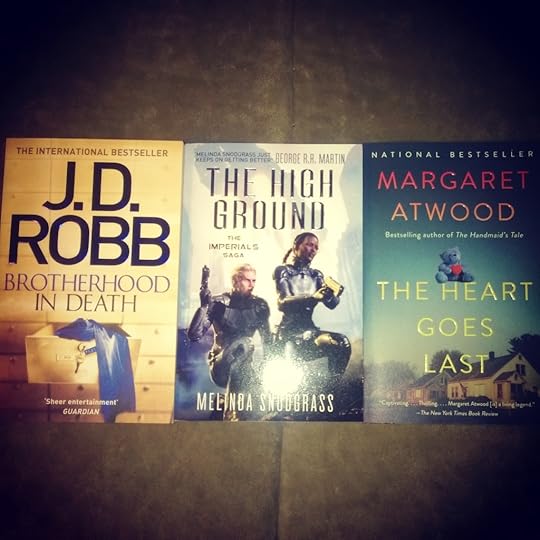
And here is yesterday’s book haul: Great science fiction by women writers. A pretty good haul, especially since the bookstore only carries about fifty English language books, half of which are by Jeffrey Archer.
*Until 2014, the St. Antoniushaus was run by nuns. At least one of the nuns is still there, but nowadays the house is run by laymen.
 Send to Kindle
Send to Kindle
August 11, 2016
The Silencer returns in “Fact or Fiction”
I’ve been somewhat quiet on this blog of late, because I spent the whole of July doing a writing challenge, which involved writing a short story per day. I pulled it off, too, and blogged about my experiences over at Pegasus Pulp. So expect a bunch of new releases, including a new series, in the next weeks or months.
The first of these new releases is already here and it features an old friend, pulp writer Richard Blakemore a.k.a. the masked crimefighter known only as the Silencer.
What inspired Fact or Fiction was the realisation that even though Richard Blakemore is a pulp writer, we hardly ever see him writing. So I decided to remedy that and give Richard a quiet evening at home, since the weather is too foul for crimefighting.
In the course of that evening, we not just finally get to see Richard writing, we also find out just how much he embellishes the Silencer’s adventures for the pulps to satisfy his editor’s requests for relentless action and euphemistic descriptions of rosy skin and lush curves. Oh yes, and don’t use the word “brothel”, cause it will upset the guardians of public decency, and absolutely don’t mention to rat shit.
Richard’s fiancée Constance and the kitten Richard rescued at the end of Elevator of Doom reappear as well. The kitten is now called Edgar, named for Edgar Allan Poe, Edgar Rice Burroughs and Edgar Wallace. Because Richard absolutely would name his cat for his literary heroes.
So what are you waiting for? Pick up your copy of Fact or Fiction today.
Fact or Fiction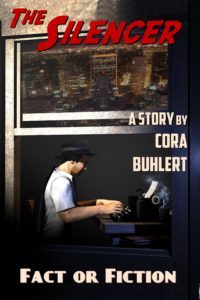 New York City, 1936: It’s a rare evening at home for Richard Blakemore, hardworking pulp writer by day and the masked vigilante only known as the Silencer by night. But even though crime never rests, next month’s Silencer novel doesn’t write itself. And besides, Richard enjoys the chance to spend some time with his fiancée Constance Allen.
New York City, 1936: It’s a rare evening at home for Richard Blakemore, hardworking pulp writer by day and the masked vigilante only known as the Silencer by night. But even though crime never rests, next month’s Silencer novel doesn’t write itself. And besides, Richard enjoys the chance to spend some time with his fiancée Constance Allen.
Pulp fiction thrives on exaggeration and non-stop action. And as always, the question is how much of the Silencer’s adventures are fact and how much is fiction?
More information.
Length: 2700 words.
List price: 0.99 USD, EUR or GBP
Buy it at Amazon US, Amazon UK, Amazon Germany, Amazon France, Amazon Netherlands, Amazon Spain, Amazon Italy, Amazon Canada, Amazon Australia, Amazon Brazil, Amazon Japan, Amazon India, Amazon Mexico, Kobo, Barnes & Noble, Apple iTunes, Scribd, Smashwords, Inktera, txtr, Thalia, Weltbild, Hugendubel, Buecher.de, DriveThruFiction, OmniLit/AllRomance e-books, Casa del Libro, e-Sentral, 24symbols and XinXii.
 Send to Kindle
Send to Kindle
July 30, 2016
Indie Speculative Fiction of the Month for July 2016
 It’s that time of the month again, time for “Indie Speculative Fiction of the Month”.
It’s that time of the month again, time for “Indie Speculative Fiction of the Month”.
So what is “Indie Speculative Fiction of the Month”? It’s a round-up of speculative fiction by indie authors newly published this month, though some June books I missed the last time around snuck in as well. The books are arranged in alphabetical order by author. So far, most links only go to Amazon.com, though I may add other retailers for future editions.
Once again, we have new releases covering the whole broad spectrum of speculative fiction. We have a whole lot of space opera and military science fiction this month as well as funny science fiction, dystopian fiction, Steampunk, epic fantasy, urban fantasy, Asian fantasy, young adult fantasy, young adult science fiction, fairytales, horror, vampires, fae, superheroes, blighters, alien invasions, galactic conspiracies, royal weddings, interrupted dinners, cardboard spaceships, haunted houses, time travel and much more.
Don’t forget that Indie Speculative Fiction of the Month is also crossposted to the Speculative Fiction Showcase, a group blog run by Jessica Rydill and myself, which features new release spotlights, guest posts, interviews and link round-ups regarding all things speculative fiction several times per week.
As always, I know the authors at least vaguely, but I haven’t read all of the books, so Caveat emptor.
And now on to the books without further ado:
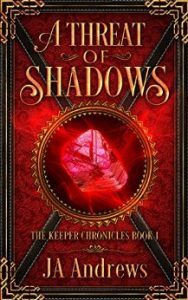 A Threat of Shadows by J.A. Andrews:
A Threat of Shadows by J.A. Andrews:
There are decisions that can’t be unmade, paths that cannot be unchosen, choices that change us too much for us to ever change back.
In a desperate attempt to save his dying wife, Alaric has sacrificed everything. He’s abandoned his position as advisor to the Queen, he’s cast aside his role as a Keeper, he’s betrayed his deepest beliefs.
And still he has failed.
Now he’s found one last chance at a cure. Haunted by the choices he has made and surrounded by companions who have dangerous secrets of their own, he returns to the people and land he turned his back on.
But soon the quest to save his wife becomes entangled with a larger quest. Gathering shadows threaten the land, whispering of the return of a dark lord, thought to be defeated.
To fight this enemy, the world needs the Keeper Alaric used to be, not the broken man he has become.
Can he regain what he’s lost? Or do some choices change us too much for us to ever go back?
Alaric must decide or, in the face of all the growing shadows, it may be the darkness he carries within himself that destroys everything.
 The Three Quarters Eaten Dessert by Cora Buhlert
The Three Quarters Eaten Dessert by Cora Buhlert
Bertha and Alfred, married for twenty years, enjoy a truly science fictional life in the twenty-first century. But in spite of all the technological marvels surrounding them, an argument about sharing a dessert at an upscale restaurant escalates and threatens their friendship with their neighbours, the Hoppenstedts.
This parodistic piece is a mundane short story of 6000 words or approximately 25 print pages, written in the style of science fiction’s “golden age” of the 1940s and 1950s. With bonus recipe.
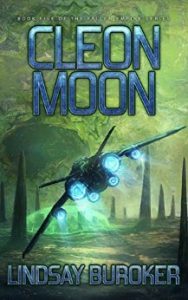 Cleon Moon by Lindsay Buroker:
Cleon Moon by Lindsay Buroker:
Now that she’s retrieved the Staff of Lore, Captain Alisa Marchenko can finally dedicate herself and her ship to finding her kidnapped daughter. Her scant clues lead her to Cleon Moon.
Unfortunately, since the fall of the empire, mafia clans have taken over the domed cities on the harsh moon, and exploring there isn’t easy. Even with the cyborg Leonidas at her side, Alisa struggles to survive vengeful mafia clans, rogue Starseers, and genetically engineered predators. To further complicate matters, she must worry about the ancient relic hidden on her ship, a beacon to anyone in the system who craves its power. If Alisa can’t navigate the moon’s chaos, she may lose her only chance to catch up with her daughter.
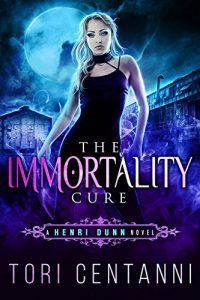 The Immortality Cure by Toni Centanni:
The Immortality Cure by Toni Centanni:
Henri Dunn was damn good at being a vampire, until her immortality was ripped away from her.
Now she must solve a murder or be executed for a crime she didn’t commit.
Six months ago, Henri was stuck with a syringe full of the poison known as “The Immortality Cure.” Now, after almost a century of being an immortal monster, Henri is human again and she’s not loving it: her body aches, she has too many mortal needs, and the other vampires shun her as a Blood Traitor. All she can do is keep her head down and bide her time until she can find a way to get her immortality back.
When vials of the serum are stolen from the lab and another vampire is murdered, Henri is the number one suspect. With the help of a melodramatic vampire “king” and his mortal groupie, Henri must find the real killer or face the wrath of vengeful vampires.
The Immortality Cure is the first book in The Henri Dunn Urban Fantasy Series, featuring a badass female protagonist and a sardonic sense of humor.
No one in Willow Street pays it any notice, not the disgruntled Campbell family next door, not Alice Cowley and her suicidal daughter, or Mr. and Mrs. Markham down the road. Not even Darryl, the loner at number seventy, who is abnormal himself, thinks much about it. It is just the old Kemper House, forgotten and abandoned.
Until it makes itself known.
When the stench of death wafts from Kemper House through Willow Street, and comes to the attention of recent resident and newspaper reporter, Ben Traynor, it starts a chain of horrors that brings Kemper House’s curse into their own homes and leads others direct to its door. Kemper House not only haunts its neighbours, it infects them with an evil that traverses time and reality itself.
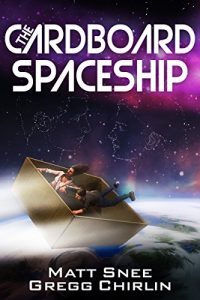 The Cardboard Spaceship by Gregg Chirlin and Matt Snee:
The Cardboard Spaceship by Gregg Chirlin and Matt Snee:
Lewis Darby, a science fiction writer of some repute, is about to embark on an adventure of a lifetime.
Also known as the Captain, Lewis lives with his mother in modern day Indiana. What nobody knows is that sometimes Captain crawls beneath an old refrigerator box in the basement and pretends it’s a spaceship. And what Captain doesn’t realize is that he has a date with destiny.
One peculiar April morning, Captain crosses paths with Jennifer Pichon, the child of legendary space explorer Marty Pichon and Kitty Malhotra, the Princess of Saturn. They join forces just in time as the terrifying astronomical event called “No-Shape” is poised to ravage the Solar System from Mercury to Neptune and beyond.
Together, Captain and the mysterious Jennifer face such terrors as the jungles of Venus, the perilous Worm Caves, and the decaying, giant insect-ridden wastes of Mars – and perhaps even fall in love along the way.
Their journey is filled with trials, but they alone can save the solar system from certain doom.
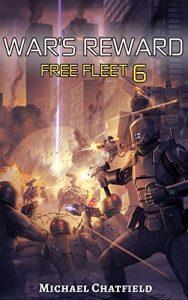 War’s Reward by Michael Chatsfield:
War’s Reward by Michael Chatsfield:
The Second Kalu War rages across known space.
The newly formed Union undergoes it’s first baptism, the baptism of war.
The Free Fleet is barely holding the line against the Kalu. Salchar and the other commanders of the Free Fleet have one goal. Survive.
As war rages politics and power brokering are at work behind the scenes in the Union.
Even if the Free Fleet survives the war, will they survive it’s aftermath?
Countries have fallen only to be replaced by corporations. After spending years in the unclaimed districts of the unemployed; Lily has nearly given up hope that anything will change. When she is told that her Mother is dying and nothing more can be done, Lily is desperate enough to try anything.
When her family is offered a position at Trustmedia, Lily thinks that all of their problems are solved. Until she realizes that her acceptance is conditional. She will have to prove that she has what it takes to stay. If she fails, she will be thrown out and never see her family again.
Lily quickly finds that staying will be harder than she expected, even Father seems intent on seeing her fail. Things become complicated when her Father injects her with an unknown substance and she begins to have intensely vivid dreams. Lily is on the verge of having everything she has ever wanted, but does she have what it takes to keep it?
 High Flight & Flames by Kate Coe:
High Flight & Flames by Kate Coe:
The land of Quorl is under attack. S’ian, badly injured when her Glider crashed is trapped in a city under siege. Meanwhile out on the plains, Toru is desperately defending his own city and people from the advancing enemy. The fighting is no longer between men: a battle for the air has started, and new weapons force both sides into desperate measures. Even if Toru succeeds in pushing the enemy back from Meton, what will the cost be? Can Toru reconcile his duty to his country with his own dreams?
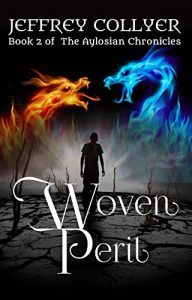 Woven Peril by Jeffrey Collyer:
Woven Peril by Jeffrey Collyer:
The Guardian’s forces may have left the forest, but they haven’t departed from Michael’s mind as he struggles to learn what his enemy will do next. Torn between feelings of guilt and love, he must now push ahead to find mythical halls deep in the earth, where secrets from the distant past are spoken of, and new riddles unearthed.
Entering dark paths, Michael must learn to use his growing power if he is to discover that which will save the land, at the same time as trying to protect those now under his care from new and deadly monsters sent to hunt him.
And all while he struggles to understand mysteries surrounding his mother.
Woven Peril is the thrilling second book in the Aylosian Chronicles, and continues the epic tale in a world of unusual magic and unique creatures.
 Heartfelt Sounds by C.M. Estopare:
Heartfelt Sounds by C.M. Estopare:
Orphaned Naia Belle is an apprentice songstress, attached for life to her silkhouse in the illustrious pleasure capital of Sorrel, Felicity. But as the dark clouds of war descend upon Felicity, Naia, ill-prepared and not yet fully trained, is forced from her home and into a nightmare she never imagined.
Driven once more from the haven she finds, posing as a boy and conscripted into a foreign army, Naia struggles to remain hopeful in spite of the trials she faces. Then she discovers there are those who wish to reopen Heaven’s Gate and allow titans to walk the mortal realms once more. Only one power can stop them.
As her friends and allies fall around her, beset by sand wraiths and the soulless dead, with everything she loved now lost to her, Naia faces yet another challenge: the blackened plains of the Void, where she may learn the true power of her voice. A power the necromancers and titans would kill to stop.
HEARTFELT SOUNDS, is the first book in the exciting fantasy coming-of-age trilogy, THE WORLD OF SORREL.
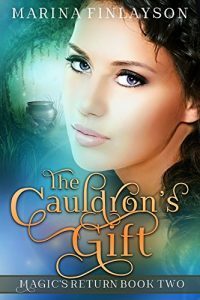 The Cauldron’s Gift by Marina Finlayson:
The Cauldron’s Gift by Marina Finlayson:
When Vi and her twin sister CJ started spitting frogs and diamonds with every word, they discovered their parents worked for a secret organisation dedicated to keeping the magical denizens of the world safely locked away. Vi thought life couldn’t get any weirder, but then Dad became a bear, and her world really fell apart. Because it’s starting to look like that’s one spell the warders can’t undo. They’re all too busy trying to unmask the traitor who is secretly aiding the Sidhe.
Vi managed to keep the Sidhe from breaking out of their magical prison, but she couldn’t stop the Morrigan from stealing back the great cauldron of the Dagda. And of course now CJ says the only way to save Dad is to get that cauldron back from fairyland. Talk about a suicide mission. Vi would have to be crazy to consider it, but as time runs out for Dad and the Morrigan threatens everyone Vi loves, craziness starts to look like the only sane option.
First contact didn’t go as planned…
Time Gate 8, one of humanity’s portals between the stars, has been overrun by a mysterious alien intelligence, and the planet Luddeccea is now cut off.
Haunted by those she left behind, Commander Noa Sato is on a desperate mission to save her homeworld. Navigating the ancient Ark, she seeks a hidden gate that will transport her ship to Earth and the Galactic Fleet. But the Luddeccean system harbors dangers, and so does her crew.
The only crew member she completely trusts is James Sinclair, but he doesn’t trust himself.
James isn’t the man he once was. He has a hunger that is never sated, kills without regrets, and is fitted with extraordinary augments he doesn’t remember getting. Can James control his augments, or will they control him?
In a future where almost all humans are augmented, James’s answer and Noa’s mission will determine the fate of the human race … and the enemy is already within the gates.
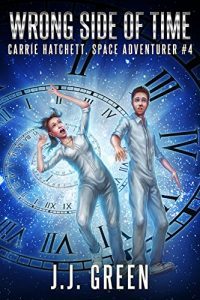 Wrong Side of Time by J.J. Green:
Wrong Side of Time by J.J. Green:
When the greatest minds in the galaxy can’t solve a problem through logic or reason, they call Carrie Hatchett.
Carrie and her reluctant sidekick, Dave, have succeeded in driving the evil mechanical aliens, the placktoids, to their only remaining hiding place—the past. But the danger isn’t over. The Transgalactic Council suspect the placktoids are trying to change the course of history and re-emerge as rulers of the galaxy.
Carrie and Dave are sent on a mission to defeat them, but even attacks from Carrie’s psychotic cat can’t prepare the two for the challenges they face when they travel back in time to the placktoid planet: searing temperatures, a barren landscape and primitive robots with OCD. And waiting in the wings is the placktoid High Commander, whose 3D printing ability is lethal.
Naively optimistic Carrie needs to recognise what’s staring her in the face if she’s to defeat the placktoids and avoid being trapped in the past forever.
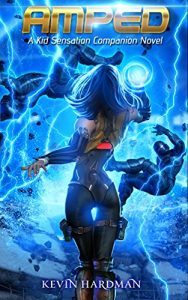 Amped: A Kid Sensation Novel by Kevin Hardman:
Amped: A Kid Sensation Novel by Kevin Hardman:
Electra – the beautiful, unflappable girlfriend of teen super Kid Sensation – headlines her own adventure for the first time.
A foundling adopted and raised by the Alpha League (the world’s greatest superhero team), Electra has exhibited super powers since infancy. However, her past has remained a mystery for the most part, with those few people with any knowledge of her background being reluctant to talk.
Refusing to remain ignorant of her own origins, Electra embarks on a fact-finding mission intent on discovering who she really is. However, in addition to providing more questions than answers, her investigation causes her to cross paths with a powerful group of supervillains, who see in her a means of furthering their goal of world domination.
Finding herself in the crosshairs, Electra must now find a way to stop those seeking to exploit her unique talents for their own nefarious purposes. Because if she can’t, the world will pay a heavy price.
Balmoral Murraine works in a Battery, assembling devices she doesn’t understand for starvation pay. Pasco Eborgersen is the pampered son of an Elite, trying to navigate the temptations of the Pleasure Houses, the self-sacrifice of the Faith, and the high-octane excitement of Steel Ball. They never should have met, and now they will rip the world apart.
What happens when ninety percent of the world lives on skaatch – a jellyfish and insect composite?
What happens when mankind spends more time in alternative life sims instead of in the “real” world?
What happens when economic interest is the sole determinant of global decision making?
What happens when a single secret is discovered that calls into question everything we have ever believed?
Welcome to the Autonomy. Welcome to your future.
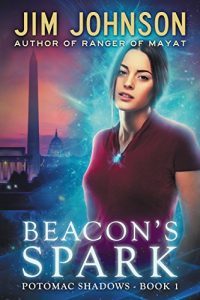 Beacon’s Spark by Jim Johnson:
Beacon’s Spark by Jim Johnson:
Twentysomething Rachel Farran dropped out of college after family pressures drove her to the edge. Now disowned by her parents, the only things going for her are her girlfriend, her bestie, and visits to her ailing grandpa, the only member of her family who even really likes her.
When Rachel stumbles into the mystical Veil separating the mortal and spirit worlds, her world is turned inside-out. She soon discovers that she is a Beacon, a descendant of the ancient Fates and a guide for lost souls who can manipulate magical ley threads. But when the malevolent being known as the Spinner harnesses the ley to drag helpless souls through the Veil to devour them, can Rachel learn to control her newfound abilities before her grandpa and many others are lost forever?
Beacon’s Spark is the first book in Potomac Shadows, a new paranormal fantasy series set in the Washington, DC metro area.
Them Blighters are everywhere.
They fell out of the sky last year, great horrible armour-plated slugs with razor-sharp fangs. But ugly as they are, they give the ultimate high to anyone nearby: a blissful, gleeful contentment that people are willing to kill for.
Not Becky Stone, though. All she wants is to drink beer, listen to her dad’s old vinyl, and get her life back to how it was before everything was all messed up.
Blighters? Frankly, she could do without them.
“Contains true craft and substance… You’ll finish this novella and immediately start it over again.”
Urban Fantasy Magazine on Carus & Mitch
With the Celestial Swords and their bearers united, Xu Liang heads for his homeland. Having lost his spiritual connection with the Empress, he is unprepared for the severity of Chaos’ grip on the land and its people. Fear is spreading throughout Sheng Fan. War is in the air. There is dissension in the ranks of the Empire and Xu Liang’s favor with the Empress seems to be in question, his once influential position now tenuous. The coming together of the Blades seems for naught while enemies from within threaten to tear apart his allegiance with the outsiders he dared to bring into Sheng Fan by spreading dangerous rumors. It seems that Xu Liang can do little more than watch as the Dragon continues to rise, every hour clawing its way deeper into the heart of the Empire, which slowly rends itself apart with the governors of the Five Kingdoms taking up arms against each other, as well as against the Song Dynasty. Those allied by the Swords must put Chaos to rest—be it an actual dragon, or war itself—but first they must find peace within themselves and amongst each other.
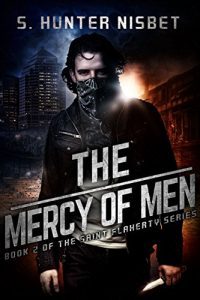 The Mercy of Men by S. Hunter Nisbet:
The Mercy of Men by S. Hunter Nisbet:
The anticipated second installment of the Saint Flaherty series moves from the hills of Appalachia to a city where law no longer prevails.
When Simon Flaherty’s routine of training and fighting is interrupted by a sudden eviction, he never expects his new neighbor to be the one person he thought was long gone from Scioto City: Connor Hall.
It’s been six years since they escaped from Buchell together—six years since Connor walked out of Simon’s life and never looked back. For Connor, it hasn’t been long enough. Trapped in a cycle of debt to the syndicate he works for, he’s barely making it payment to payment while juggling two jobs and university. One more burden will destroy him, and the help Simon is willing to give can’t balance the shadows of their past.
Fighting isn’t all Simon’s been doing in the years since arriving in Scioto, and the crime bosses of the city have their eyes on him. Getting involved with another syndicate’s business isn’t an option. But if Connor doesn’t find a way to pay back his debts, Simon will do anything to make sure Connor doesn’t pay the price for breaking a deal with a syndicate boss.
In a city without mercy, “anything” goes a long way.
With the destruction of the Earth ship Colossus the 3rd interstellar war is about to begin. The Cabal plan to reveal their political intentions to the Galaxy, but before they can, they have to eliminate their enemies first. Athena and her whole family are in their sights along with anyone that stands in the way of progress and control. Who will survive the onslaught and who will die? Only time will tell.
Join Athena, Wilson and the CATTs as they set out to prove that might does not equal right!
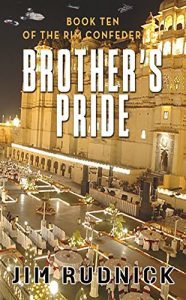 Brother’s Pride by Jim Rudnick:
Brother’s Pride by Jim Rudnick:
While the wrecked alien ship on Ghayth provides some interesting new technology, Admiral Scott has nothing on his mind but his upcoming wedding to the Lady St. August. In only a couple of months, he’ll have vows to pledge and a ring to don as he becomes a Royal himself to take the new title of Lord Scott. And the only thing in his way—even though he doesn’t know it, is his sister Gia who has pledged revenge upon him for the death of their sister, Nora.
With the upcoming release of the Ikarian longevity vaccine, the RIM Confederacy realms are all wanting more and more of the vaccines to double their lifetimes, while the Baroness is purposely chocking off the supply. Added to that is the fact that the Master Adept knows what will happen at the wedding and she is hurriedly training her own replacement and the wedding will be where the assassination attempt is made.
But the Master is not the only wedding party member to die at the altar as the admirals sister takes careful aim and screams out her revenge and Tanner falls as do others—all to pay penance for his crime of decades ago…
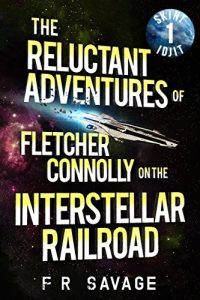 The Reluctant Adventures of Fletcher Connolly on the Interstellar Railroad: Skint Idjit by Felix R. Savage:
The Reluctant Adventures of Fletcher Connolly on the Interstellar Railroad: Skint Idjit by Felix R. Savage:
Fletcher Connolly hasn’t got a lot to lose. Since he, and half the galaxy, signed on to the rat race of the technological relics trade, Fletch has long since come to terms with the idea that he will join the ranks of the unlucky explorers that perish lightyears from home without a dime to his name.
As the first mate of an old, decrepit exploration ship–the Skint Idjit–things can’t get much worse. As if that isn’t enough, he has a hard time convincing himself his luck is bound to change when he finds himself stranded on the planet Suckass, on a remote branch of the Interstellar Railroad. With his new assignment an unlikely candidate to hide alien treasures, true to his personality, Fletch settles down to work on his tan.
But when disaster strikes and a member of his crew is killed, Fletch finds himself torn between loyalty to the surviving crew and the siren song of an unsuspected trove of A-tech.
Can Fletch save the Skint Idjit and her crew from a horrible death? Or will he ignore their dying screams and laugh all the way to the bank?
 Send to Kindle
Send to Kindle
July 15, 2016
Christmas in July Sale
 Writer Stacy Claflin has organised a Christmas in July sale for holiday-themed e-books.
Writer Stacy Claflin has organised a Christmas in July sale for holiday-themed e-books.
This weekend, more than 80 different e-books will be available for 99 cents or free. Two of mine are included, Christmas Gifts and Christmas Eve at the Purple Owl Café, along with more than 80 other great holiday reads in the genres romance, fantasy, mystery, suspense, humor and inspirational fiction.
The full list of participating books can be found on Stacy Claflin’s site.
So what are you waiting for? Christmas is coming (eventually), so grab yourself some cozy holiday reads now.
 Send to Kindle
Send to Kindle
July 14, 2016
New Release: Alfred and Bertha return in “The Three Quarters Eaten Dessert”
Alfred and Bertha, those crazy kids of the twenty-first century, are back for a new adventure. This time, they are having dinner with their neighbours, the Hoppenstedts – a dinner which quickly escalates into an argument.
A bit of background: Alfred and Bertha were born in response to the Not Really SF Short Story Challenge issued by writer E.P. Beaumont. At the time, there were a lot of complaints from certain quarters of the SFF sphere that literary writers were invading science fiction with their literary ways and that the virtues, values and scientific rigour of science fiction’s so-called “golden age” were being ignored. So the idea behind the challenge was to stage a counter invasion by writing a mundane short story – the sort of slice of life piece one would expect to find in literary fiction – and write it in the style of science fiction’s “golden age” of the 1940s and 1950s, complete with dated gender roles, “As you know, Bob…” dialogue and overexplanation of every mundane bit of technology.
My response to the challenge was The Four and a Half Minute Boiled Egg, a story about a married couple – Alfred and Bertha von Bülow – arguing at the breakfast table. And because I had so much fun chronicling Alfred and Bertha’s amazing life in the twenty-first century, I wrote more stories about them.
The Three Quarters Eaten Dessert is the latest of those stories. Once again, I borrowed the basic plot from a skit by legendary German comedian Loriot a.k.a. Vicco von Bülow. The skit in question is called Kosakenzipfel (Cossack’s Prick).
Lots of Latin, mansplaining, sciences versus humanities, totally random explanations of taxes, food – this story really has it all. So what are you waiting for? Experience the marvels of the twenty-first century today:
The Three Quarters Eaten Dessert Bertha and Alfred, married for twenty years, enjoy a truly science fictional life in the twenty-first century. But in spite of all the technological marvels surrounding them, an argument about sharing a dessert at an upscale restaurant escalates and threatens their friendship with their neighbours, the Hoppenstedts.
Bertha and Alfred, married for twenty years, enjoy a truly science fictional life in the twenty-first century. But in spite of all the technological marvels surrounding them, an argument about sharing a dessert at an upscale restaurant escalates and threatens their friendship with their neighbours, the Hoppenstedts.
This parodistic piece is a mundane short story of 6000 words or approximately 20 print pages, written in the style of science fiction’s “golden age” of the 1940s and 1950s. With bonus recipe.
More information.
Length: 6000 words
List price: 0.99 USD, EUR or GBP
Buy it at Amazon US, Amazon UK, Amazon Germany, Amazon France, Amazon Netherlands, Amazon Spain, Amazon Italy, Amazon Canada, Amazon Australia, Amazon Brazil, Amazon Japan, Amazon India, Amazon Mexico, Kobo, Barnes & Noble, Apple iTunes, Scribd, Smashwords, Inktera, txtr, Thalia, Weltbild, Hugendubel, Buecher.de, DriveThruFiction, OmniLit/AllRomance e-books, Casa del Libro, Flipkart, e-Sentral, 24symbols and XinXii.
 Send to Kindle
Send to Kindle
Cora Buhlert's Blog
- Cora Buhlert's profile
- 14 followers


